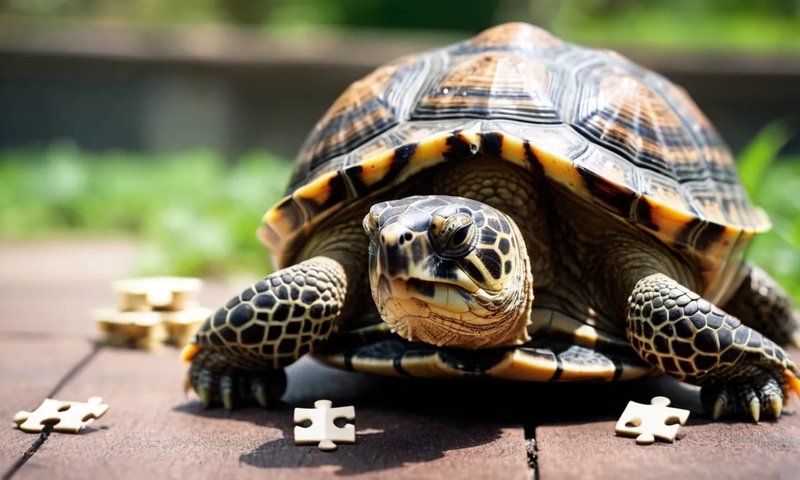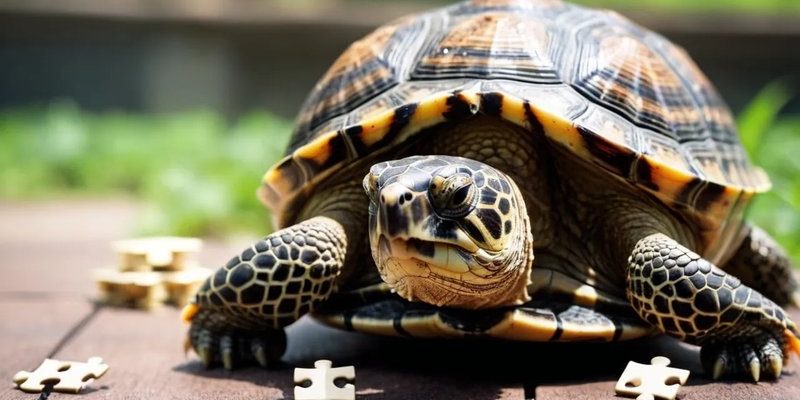
You might be wondering just how smart a tortoise really is. Well, get ready to dive into the world of tortoise behavior, intelligence, and problem-solving skills. Think of this as a gentle stroll through tortoise territory, where we’ll explore their unique traits and surprising skills—over coffee, of course.
Understanding Tortoise Intelligence
When we talk about tortoise intelligence, it’s essential to understand that their brains are wired differently than mammals. Instead of fast reflexes, they rely on slow and steady thinking. Their intelligence is often measured by their ability to solve problems and adapt to their surroundings.
Interestingly, researchers have found that tortoises can learn from experience. Imagine a tortoise figuring out that a particular path leads to a food source. If it’s successful, it will remember that route and use it again. This kind of learning shows that tortoises can think critically about their environment, which is a significant sign of intelligence.
In a study, when faced with obstacles in a maze, tortoises demonstrated the ability to find their way out, showing not just memory but also spatial awareness. So, while they may not be racing to the finish line, they’re definitely not short on smarts.
Social Behavior in Tortoises
Tortoises might seem like solitary creatures, but they have a surprising social side. They communicate with each other through body language and sounds, especially during mating seasons. This social interaction is a testament to their social intelligence.
Observe a group of tortoises, and you might see them engaging in behaviors that indicate their relationships. For instance, they might nudge each other or perform specific movements to show their dominance or submission. This type of communication reflects a level of social awareness and emotional intelligence.
Here’s the thing: Tortoises don’t just interact for the sake of it. When they establish relationships, they can even recognize their fellow tortoises over time. It’s like having a circle of friends, where they remember who’s who, even if they don’t hang out all the time.
Problem-Solving Skills of Tortoises
Let’s talk about their problem-solving skills. Tortoises have shown impressive abilities when it comes to figuring things out, especially in controlled settings. For example, researchers often set up puzzles for them, like a box that needs to be opened to access food.
In these tests, tortoises have exhibited the ability to plan actions based on what they observe. They might poke, prod, or push until they find a way to get to that tasty treat. It’s a great reminder that intelligence comes in many forms, and just because they move slowly doesn’t mean their minds aren’t racing.
One fascinating case involves a tortoise learning how to lift a latch to access food. This indicates not only the ability to learn but also to apply previous experiences to new situations. They assess, analyze, and act—much like you’d do if you were trying to open a tricky jar of pickles.
Environmental Awareness and Adaptation
Tortoises are masters of their environment. They possess a remarkable sense of awareness that helps them navigate through their habitats. For instance, they can adapt to changing conditions, which is crucial for survival.
Think about how a tortoise might respond to a new area. They take their time exploring their surroundings, using their keen sense of smell and vision to identify food sources and potential dangers. This environmental awareness allows them to thrive in various habitats, from deserts to tropical forests.
Moreover, tortoises have been observed using tools, like rocks, to break open nuts. This behavior isn’t just for show; it’s a clever adaptation that showcases their ability to use their environment creatively. It’s pretty impressive when you think about it—just like a human using a hammer to get the job done.
Memory and Learning in Tortoises
Memory plays a vital role in a tortoise’s life. These creatures rely on their memory not just to find food, but also to navigate between different areas they inhabit. They can remember locations of resources, like water and food, and return to them when needed.
Research has shown that tortoises can remember these routes for several months, sometimes even years! This ability is crucial for their survival, especially in the wild where food sources may fluctuate. Much like how you might remember your favorite coffee shop’s location, tortoises create mental maps of their habitats.
One study revealed that tortoises trained to navigate through a maze could remember the correct paths long after their training sessions. This highlights their ability not just to learn, but to retain information over time. It’s a clear indicator of their cognitive skills and ability to adapt to their environment.
So, how smart is a tortoise? It turns out they’re more complex than we often give them credit for. From their ability to solve problems and communicate socially to their remarkable memory and adaptability, these creatures showcase a unique form of intelligence that deserves appreciation.
Next time you see a tortoise, take a moment to admire not just its shell but also the brains behind it. They might not win any races, but in the world of intelligence, they’re definitely holding their own. Whether you’re a tortoise owner or just someone fascinated by nature, recognizing their cognitive abilities adds another layer to your understanding of these incredible animals. It’s about time we give our little shelled friends the credit they deserve!

